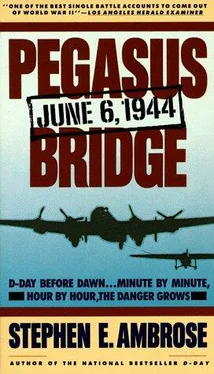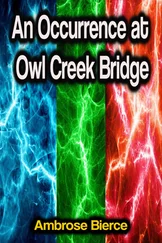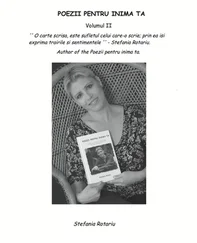Stephen Ambrose - Pegasus Bridge
Здесь есть возможность читать онлайн «Stephen Ambrose - Pegasus Bridge» весь текст электронной книги совершенно бесплатно (целиком полную версию без сокращений). В некоторых случаях можно слушать аудио, скачать через торрент в формате fb2 и присутствует краткое содержание. Жанр: История, на английском языке. Описание произведения, (предисловие) а так же отзывы посетителей доступны на портале библиотеки ЛибКат.
- Название:Pegasus Bridge
- Автор:
- Жанр:
- Год:неизвестен
- ISBN:нет данных
- Рейтинг книги:5 / 5. Голосов: 1
-
Избранное:Добавить в избранное
- Отзывы:
-
Ваша оценка:
- 100
- 1
- 2
- 3
- 4
- 5
Pegasus Bridge: краткое содержание, описание и аннотация
Предлагаем к чтению аннотацию, описание, краткое содержание или предисловие (зависит от того, что написал сам автор книги «Pegasus Bridge»). Если вы не нашли необходимую информацию о книге — напишите в комментариях, мы постараемся отыскать её.
Pegasus Bridge — читать онлайн бесплатно полную книгу (весь текст) целиком
Ниже представлен текст книги, разбитый по страницам. Система сохранения места последней прочитанной страницы, позволяет с удобством читать онлайн бесплатно книгу «Pegasus Bridge», без необходимости каждый раз заново искать на чём Вы остановились. Поставьте закладку, и сможете в любой момент перейти на страницу, на которой закончили чтение.
Интервал:
Закладка:
By 1300 the men at the bridge, and those in Benouville and Le Port, were beginning to feel disconcertingly like the settlers in the circled-up wagon train, Indians whooping all around them as they prayed for the cavalry to show up. They had enough ammunition to throw back probing attacks, but could not withstand an all-out assault - not alone anyway.
Tod Sweeney was gloomily considering the situation, sitting next to Fox. Suddenly he nudged Fox. 'Listen', he said. 'I can hear bagpipes.' Fox scoffed at this: 'Oh, don't be stupid, Tod, we're in the middle of France, you can't hear bagpipes.'
Sergeant Thornton, in his trench, told his men to listen, that he heard bagpipes. 'Go on', they replied, 'what are you talking about, you must be bloody nuts.' Thornton insisted that they listen.
Howard, at his CP, was listening intently. Back at Tarrant Rushton, he. Pine Coffin, and the commander of the Commandos, the legendary Lord Lovat, had arranged for recognition signals when they met in Normandy. Lovat, arriving by sea, would blow his bagpipes when he approached the bridge, to indicate that he was coming. Pine Coffin's bugler would blow back, with one call meaning the road in was clear, another that it was contested, and so on.
The sound of the bagpipe became unmistakable; Pine Coffin's bugler answered with a call that meant there was a fight going on around the bridges.
Lovat's piper. Bill Millin, came into view, then Lovat. It was a sight never to be forgotten. Millin was beside Lovat, carrying his great huge bagpipe and wearing his beret. Lovat had on his green beret, and a white sweater, and carried a walking stick, 'and he strode along', Howard remembers, 'as if he was on a flaming exercise back in Scotland'.
The Commandos came on, a Churchill tank with them. Contact had been made with the beachhead, and the men of D Company were ecstatic. 'Everybody threw their rifles down', Sergeant Thornton remembers, 'and kissing and hugging each other, and I've seen men with tears rolling down their cheeks. I did honestly. Probably I was the same. Oh, dear, celebrations I shall never forget.'
When Georges Gondree saw Lovat coming, he got a tray, a couple of glasses, and a bottle of champagne then went dashing out of his cafe, shouting and crying. He caught up to Lovat, who was nearly across the bridge, and with a grand gesture offered him champagne. Lovat gave a simple gesture of 'No, thanks', in return, and marched on.
The sight was too much for Wally Parr. He ran out to Gondree, nodding his head vigorously and saying, 'out, oui, oui'. Gondree, delighted, poured. 'Oh dear'. Parr says, 'that was good champagne. Did it go down easy'.
Lovat met Howard at the east end of the bridge, piper Millin just behind him. 'John', Lovat said as they shook hands, 'today history is being made'. Howard briefed Lovat, telling him that once he got his troops over the canal bridge it was clear sailing. But, Howard warned, be careful going over the bridge. Lovat nevertheless marched his men across, and as a consequence had nearly a dozen casualties. Vaughan, who treated them, noted that most were shot through their berets and killed instantly. Commandos coming later put on their steel helmets to cross the bridge.
The last of the Commandos to pass through handed over to Howard a couple of bewildered-looking German soldiers, wearing only their underwear. They had run for it when D Company stormed the bridge, then hidden in a hedge along the canal towpath. When they saw the Commandos coming from the coast they decided it was time to give themselves up. A Commando Sergeant handed them over to Howard with a wide grin and said, 'Here you are, sir, a couple of the Panzoff Division!'
A few of the tanks coming up from the beaches went on into Benouville, where they set up a solid defensive line. Some crossed the bridges to go to Ranville and the east, to bolster the 6th Airborne Division in its fight against 21st Panzer Division.
The Germans tried a counter-attack coming straight up the canal. At about 1500 hours, a gun-boat came from Caen, loaded with troops. Bailey saw it first and alerted Parr, Gray and Gardner, manning the anti-tank gun. They had a heated discussion about range, but when they fired they were thirty yards short. The boat started to turn, they fired again, and hit the stern. The boat chugged off, back towards Caen, trailing smoke.
From about mid-afternoon onwards, the situation around the bridge stabilised. The 8th Heavy Grenadiers, and Major Becker's battle-group, had fought bitterly. But, as Kortenhaus admits, 'we failed because of heavy resistance. We lost thirteen tanks out of seventeen!' The Germans continued sniping and firing the Moaning Minnies, but they were no longer attacking in any strength.
'It was a beautiful evening', Nigel Taylor remembers. At about 1800 hours, when he was sure his position in Benouville was secure, he had himself carried down to the Gondree cafe, so that he could be tended to at the aid post. When his leg wounds were bandaged he hobbled outside and sat at a table just beyond the front door. 'And Georges Gondree brought me a glass of champagne, which was very welcome indeed after that sort of day, I can tell you. And then that evening, just before it got dark, there was a tremendous flight of aircraft, hundreds of British aircraft. They came in and they did a glider drop and a supply drop between the bridges and the coast on our side of the canal. It was a marvellous sight, it really was. They were also dropping supplies on chutes out of their bomb doors, and then it seemed only a very few minutes afterwards that all these chaps in jeeps, towing anti-tank guns and God knows what, were coming down the road through Le Port, and over this bridge.'
Taylor sipped his champagne, and felt good. 'At that moment I can remember thinking to myself, "My God, we've done it!" '
Among the gliders were the men of Brigadier Kindersley's Airlanding Brigade, D Company's parent outfit. The companies, with their heavy equipment, began moving across the bridge, towards Ranville and beyond to Escoville, which they were scheduled to attack that night or the following morning. As the Ox and Bucks marched past. Parr, Gray and the others called out, 'Where the hell you been?' and 'War's over', and 'A bit late for parade, chaps', and other such nonsense.
Howard's orders were to hand over to a seaborne battalion when it came up, then join the Ox and Bucks in Ranville. About midnight, the Warwickshire Regiment of 3 Division arrived. Howard briefed the commander. Parr handed over his antitank gun to a sergeant, showing him how to work it. 'I was a real expert on German artillery by this time'. Parr says.
Howard told his men to load up. Someone found a horse cart - but no horse. The cart was a big, cumbersome thing, but the men had a lot to carry. All their own equipment, plus the German gear they had picked up (every soldier who could had changed his Enfield for a Schmeisser, or his Bren for an MG 34), filled the cart.
D Company started off, headed east, towards the river bridge and over it to Ranville. Howard was no longer under the command of Pine Coffin and Poett; he reverted to his regular chain of command and hereafter reported to his battalion colonel, Mike Roberts. He had carried out his orders, and almost exactly twenty -four hours after his men stormed the bridge, he handed over his objectives intact and secure.
Jack Bailey found it hard to leave. 'You see', he explains, 'we had been there a full day and night. We rather felt that this was our bit of territory'.
CHAPTER NINE
D-Day plus one to D-Day plus ninety
Benouville was as far inland as the British seaborne units got on D-Day. The original plan had been to drive the armour coming in over the beaches right through Benouville, along the canal. road, straight into Caen. But the fierceness of the opposition at Benouville and Le Port and Ranville convinced the British high command that prudence required going over to the defensive. And that was what they did for the next seven weeks, attempting only once - late in July, in Operation Goodwood - to breakout.
Читать дальшеИнтервал:
Закладка:
Похожие книги на «Pegasus Bridge»
Представляем Вашему вниманию похожие книги на «Pegasus Bridge» списком для выбора. Мы отобрали схожую по названию и смыслу литературу в надежде предоставить читателям больше вариантов отыскать новые, интересные, ещё непрочитанные произведения.
Обсуждение, отзывы о книге «Pegasus Bridge» и просто собственные мнения читателей. Оставьте ваши комментарии, напишите, что Вы думаете о произведении, его смысле или главных героях. Укажите что конкретно понравилось, а что нет, и почему Вы так считаете.




![Stephen Ambrose - Citizen Soldiers [Condensed]](/books/346737/stephen-ambrose-citizen-soldiers-condensed-thumb.webp)




